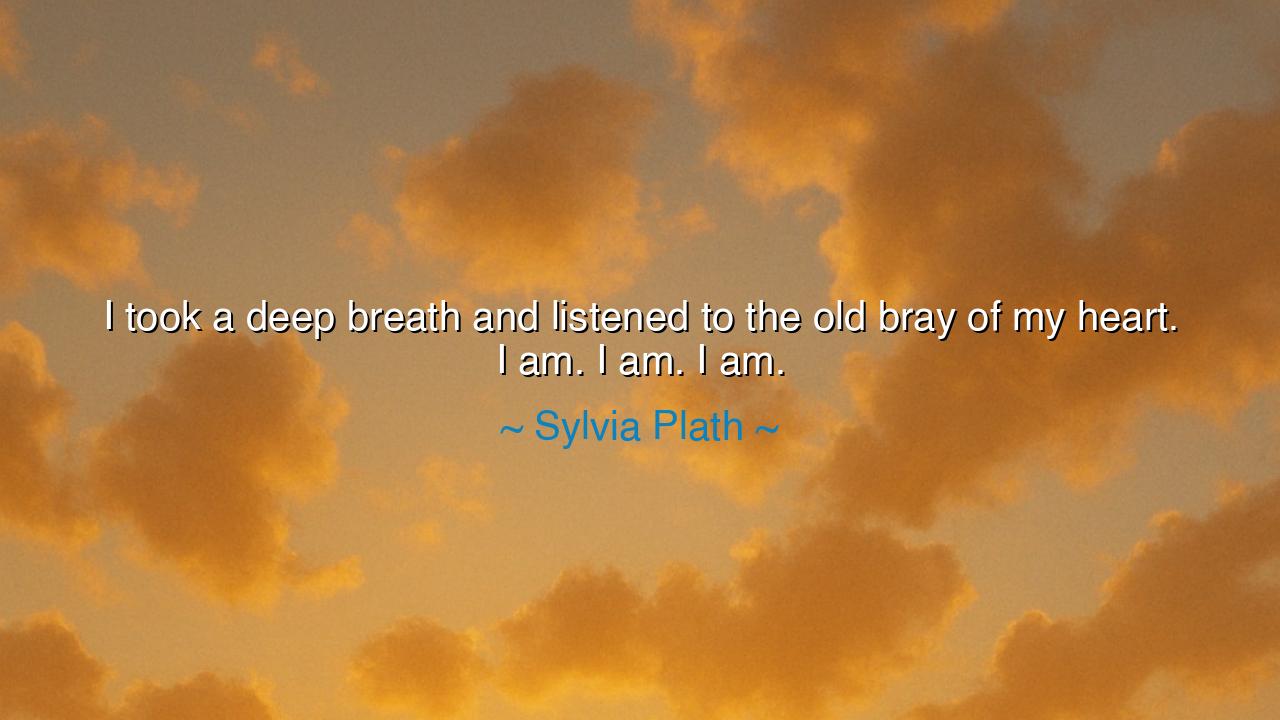
I took a deep breath and listened to the old bray of my heart. I






The words of Sylvia Plath — “I took a deep breath and listened to the old bray of my heart. I am. I am. I am.” — are among the most haunting and triumphant declarations ever set to paper. They are both fragile and fierce, the cry of a soul teetering between despair and defiance. In them we hear the echo of existence itself, stripped to its rawest form. It is the reminder that beneath the turbulence of thought, beneath the storms of sorrow, there beats a single, undeniable truth: I am. To breathe, to hear the pulse of the heart, to affirm one’s being — this is life itself, and in that recognition lies a form of victory.
Plath’s words rise from her deep and troubled journey. Her life was marked by brilliance, creativity, and struggle against inner shadows. Yet even within her battles, she found in the simple rhythm of her own heartbeat a grounding truth. The body, relentless and unyielding, declares what the mind sometimes forgets: existence. Her triple repetition — “I am. I am. I am.” — is not mere poetry but incantation, a mantra of survival. Each beat says, “I remain. I endure. I continue.” It is the voice of being itself, older than words, older than despair.
The ancients understood the power of such affirmations. In the Hebrew scriptures, when Moses asked the Divine name, the answer came: “I Am that I Am.” Being itself was the first truth, needing no adornment. Likewise, in the wisdom of Eastern philosophy, yogis meditated on the phrase “So Hum” — “I am that” — as the natural sound of breath, the eternal rhythm of life joining the human soul to the infinite. Plath’s words, born in her own century of turmoil, join this ancient lineage: the declaration that existence itself is sacred, even when wounded.
History too gives us examples of this elemental defiance. Recall Nelson Mandela in his long imprisonment, where the outer world sought to strip him of identity and hope. Yet each morning he breathed, each day his heart declared, “I am.” Though confined, his being could not be erased. And in the end, his simple endurance carried him from darkness into triumph. His story, like Plath’s words, reveals that sometimes the greatest power lies not in grand declarations, but in the sheer, quiet insistence of existence.
Plath’s quote also speaks to those who battle inner storms — depression, despair, self-doubt. When the mind is heavy and hope seems distant, the act of taking a breath and listening to the heart is a reminder of one’s unshakable reality: you are here. You exist. That alone is a seed of strength. It is the grounding that allows one to take the next step, to endure the next day, to live long enough for light to return. Thus, her words carry both grief and inspiration, both a cry and a hymn.
The lesson is clear: never forget the sacredness of your own being. Before you chase achievements, before you seek recognition, remember the simple truth: I am. Existence itself is a gift, and from that foundation all meaning can grow. When you feel lost, return to your breath, to your heartbeat, and hear the truth that needs no justification. From there, you can rebuild. From there, you can endure. From there, you can rise.
Practical wisdom follows. In moments of stress or despair, pause and take a slow breath. Place your hand upon your chest and listen to the steady rhythm of life within. Repeat Plath’s mantra: “I am. I am. I am.” Let it remind you that being is enough, that you need not prove your worth to exist. Carry this practice into daily life, not as mere words, but as a shield against despair and a celebration of life’s most fundamental truth.
So remember, child of tomorrow: when the world roars with confusion, when your mind trembles with doubt, return to the breath, return to the heart, and repeat the ancient mantra: I am. I am. I am. For in those words lies both the humility of survival and the majesty of existence. This is the wisdom Sylvia Plath left us: that even in the darkest night, the heartbeat sings of life, and life itself is reason enough to endure.






AAdministratorAdministrator
Welcome, honored guests. Please leave a comment, we will respond soon